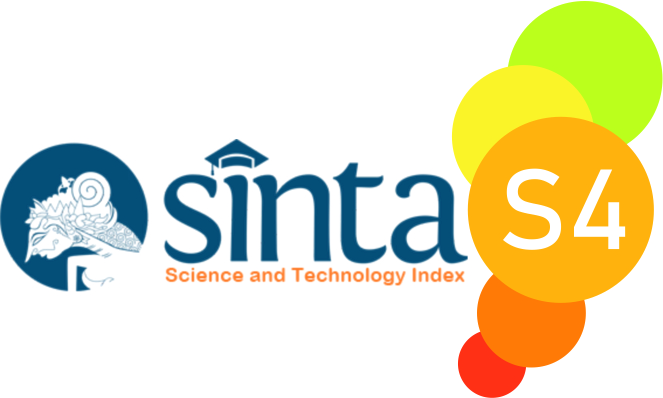IMPROVING STUDENTS’ VOCABULARY MASTERY USING SPELLING BEE GAME AT FIFTH GRADE IN SDIT YA BUNAYYA PUJON
Abstract
The research caused by lacking of students’ vocabulary mastery in English Subject. One of the methods for improving vocabulary is Spelling Bee game. The action research aims to measure the effectiveness of the use of the spelling bee game method in improving students' mastery of English vocabulary and to determine students' responses motivated towards the application of this game. The research uses classroom action research (CAR) caused by Arikunto Suharsimi at students’ fifth grade in SDIT Ya Bunayya Pujon. The research is done two cycle. In every cycle consist of three meeting with the activity: plan, action, observation, reflection. Pre-test and post-test are given in the form of vocabulary tests. Data obtained from the pre-test and post-test were analysis in a classical completeness with a minimum quality standard of 75. The results of the analysis show that in cycle 1 was an average score of 70.26 with a classical completeness of 47, 05%. Furthermore, the results of the study in cycle 2 getting a significant improvement in which the score obtained was an average of 82.91 with a classical completeness reaching 88.24%. An increase from cycle 1 to cycle 2 in the classical completeness obtained reaching 41.19%. While, the implementation of the method makes students pay more attention, active, ability and motivated in learning English. From these results it means that the application of the game Spelling Bee has an influence on improving students' mastery of English vocabulary. Based on the results of this study, the application of learning with the game Spelling Bee is recommended to teachers to create a pleasant atmosphere for students, especially young learner in learning English vocabulary.
References
Carter, P. (2002). English with games and activities, retrieved from https://epdf.pub/english-with-games-and-activities-elementary.html, on march 9th, 2020.
Gozcu, E. & Caganaga, C., K. (2016). The Importance of Using Games in EFL Classroom. Cypriot Journal of Educational Science [online] 11(3),126-135.
Hadfield, J. (1998). Elementary vocabulary games. Harlow: Pearson Education Limited.
Hiebert, E. H. & Kamil, M. L. (2005). Teaching and Learning Vocabulary: Bringing Research to Practice (P.2). Lawrence Erlbaum Associates, Inc., Publishers.2005. [online]. https://books.google.co.id/books? id=v6aPAgAAQBAJ. Accessed on May 9th, 2020
Huyen, N. T. T. & Nga, K. T. T. (2003). Learning Vocabulary through Games: The Effectiveness of Learning Vocabulary through Games. Asian EFL Journal, (online), 5(4): 1-15, (http://www.asian-efl-journal.com)
Inna, A. (2016). Improving Vocabulary Achievement through Matching Word Game for The First Grade Students At SMP Negeri 4 Wewewa Barat [Thesis]. Malang: IKIP Budi Utomo Malang, 2016.
Kloos, C. D. (2014). Game Based Spelling Learning. Conference Paper. Proceedings - Frontiers in Education Conference. 2008. Retrieved from https://www.researchgate.net/publication/224361212_Game_based_spelling_learning. on February 3th, 2020
Macmillan. (2012). Brainwave Spelling Bee Handbook. Macmillan Publisher Ltd. 2012. Retrieved from: http://www.macmillanyounglearners.com/brain
wave/microsites_files/www.macmillanyounglearners.com.brainwave/BW_Spelling_Bee_Handbook.pdf. On February 5th, 2020
Noemí, PM. (2014). Educational Games for Learning. Journal. Universal Journal of Educational Research 2(3): 230-238, 2014. Retrieved from https://files.eric.ed.gov/fulltext/EJ1053979.pdf. on march 9th, 2020.
Oxford Dictionary. (2015). Oxford Advanced Learner’s Dictionary. 9th Edition. United Kingdom: Oxford University Press. 2015.
Pujiastuti, C. (2016). Using Memory Matching Game to Increase Students’ Vocabulary at Third Grade of SDK Indrayasana Malang. Thesis. Malang: IKIP Budi Utomo Malang, 2016.
Renandya A. & Richard J.C. (2002). Methodology in Language Teaching: An Anthology of Current Practice. Cambridge: Cambridge university press.
Rohmatillah. (2014). A Study on Students’ Dificulties in Learning Vocabulary. Jurnal Tadris Bahasa Inggris Vol 6.No 1, 2017. Retrieved from http://ejournal.radenintan.ac.id/index.php/ENGEDU/article/view/520/345. On Juni 11th, 2020.
Samosir, M. (2017). Improving Students’ Vocabulary Mastery Through Spelling Bee Game At Fifth Grade Of Sd Swasta Kalampaian Kunto Darussalam. Article Thesis. English Study Program, Faculty of Teacher Training and Education, University of Pasir Pengaraian.

Journey: Journal of English Language and Pedagogy by http://ejurnal.budiutomomalang.ac.id/index.php/journey/index is licensed under a Creative Commons Attribution-ShareAlike 4.0 International License.






